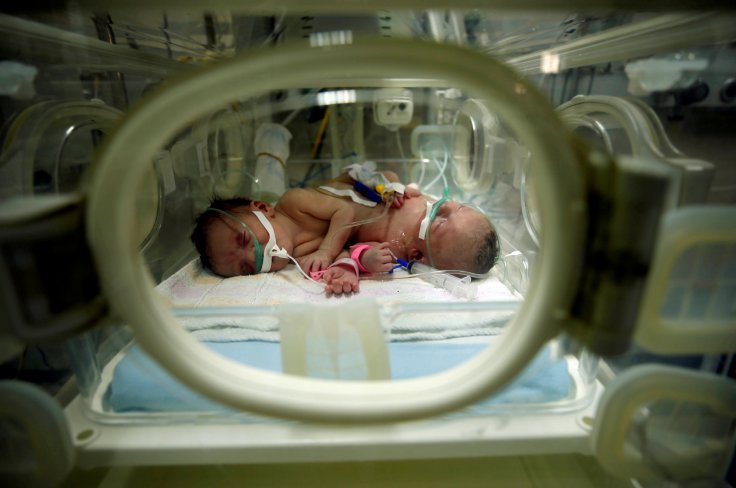
A mother of premature twins born just at 25 weeks against the odds claimed her stronger son, who cuddled her brother in an incubator, saved his brother's life. According to the mother, Dylan saved the life of his twin brother Deiniol, who weighed just 1lbs 9oz at the time of birth, by cuddling him when medics feared he will not survive.
The 28-year-old mother claims the condition of Deiniol miraculously improved after a cuddle with his brother Dylan, whose condition was stable and was allowed to return home after 14 weeks in the hospital, and has hailed the "unbreakable bond" between her premature twin boys.
Hannah Zimunya, the mother, said the lungs of the twins were so underdeveloped at the time of the birth that they were transferred to the nearest neonatal intensive care unit in Royal Bolton Hospital 60 miles (97km) away.
Doctors at Maelor Hospital in North Wales told Zimunya to prepare for the worst when she went into labour 15 weeks early and gave birth to the twins hooked up to breathing machines and wrapped in plastic body bags to recreate the warmth and humidity of the womb.
"You don't expect both of your babies to be taken away from you almost as soon as you've given birth to them, even worse than they were transferred to a completely different hospital," Manchester Evening News quoted the mother as saying.
She said the condition of Deiniol, who relied on ventilators to breathe, continued to deteriorate after he was split from his brother but miraculously improved just hours after the twins spent five minutes cuddled up together in the incubator.
Deiniol's oxygen levels started to shoot up and he was taken off the ventilator completely, said the mother, after medics arranged for Dylan to come back for another cuddle two days later. Doctors say a premature baby's heart rate and breathing can improve with prolonged skin-to-skin contact with a parent.
According to data, about 10 per cent of all pregnancies worldwide result in premature labour -- a delivery before 37 weeks – where all of the baby's organs, including the heart and lungs, are underdeveloped.
Doctors could not provide a scientific explanation for the sudden change in the health of Deiniol, who was finally fit and healthy enough to go home after a seven-month stay in hospital. Cath Bainbridge, a matron of Royal Bolton Hospital's Neonatal Unit, said the hospital and staff tried to do all in power for a family to help make their experience more hopeful.
"In the case of these two beautiful little boys it was beyond doubt the right thing to do," he continued. The "rescuing hug", as many parents of twins believe, "was incredible, somehow Dylan, by just being there, managed to help Deiniol - he made him better," the mother stressed while continuing to explain the bond between the twins.
"It was brilliant to watch and it showed all of us that they should never have been separated," said the stay-at-home mother, who spent 52 hours in labour as doctors were trying to postpone the birth by a week. The mother said Deiniol was still receiving 24/7 oxygen at home, but his dose was being incrementally lowered until the lungs were strong enough to breathe independently.
Premature birth is the largest cause of neonatal mortality in the US and the UK, and according to figures, less than 22 weeks is almost close to zero chance of survival.









